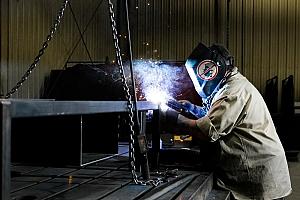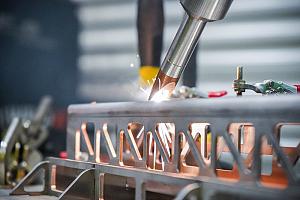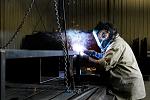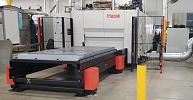President
- FMA
- The Fabricator
- FABTECH
- Canadian Metalworking
Categories
- Additive Manufacturing
- Aluminum Welding
- Arc Welding
- Assembly and Joining
- Automation and Robotics
- Bending and Forming
- Consumables
- Cutting and Weld Prep
- Electric Vehicles
- En Español
- Finishing
- Hydroforming
- Laser Cutting
- Laser Welding
- Machining
- Manufacturing Software
- Materials Handling
- Metals/Materials
- Oxyfuel Cutting
- Plasma Cutting
- Power Tools
- Punching and Other Holemaking
- Roll Forming
- Safety
- Sawing
- Shearing
- Shop Management
- Testing and Measuring
- Tube and Pipe Fabrication
- Tube and Pipe Production
- Waterjet Cutting
Industry Directory
Webcasts
Podcasts
FAB 40
Advertise
Subscribe
Account Login
Search
Why I wash my car by hand
Details matter in a metal forming operation
- By Bill Frahm
- June 5, 2018
- Article
- Bending and Forming
During the warmer months, I wash and wax my car by hand. Of course, my friends find it a bit archaic. Why would I spend the time with a hose and sponge when I can simply pay $5 and drive through an automated car wash? I do it for the same reason I make my bed in the morning, care for a disabled wife, race bicycles, and encourage my colleagues in sheet metal forming to embrace fundamentals and accept change. These activities help to:
- Establish discipline.
- Encourage respect for all the small things that make everything else run smoothly.
- Encourage us to sometimes take a risk (to the disdain of my currently broken knee).
- Maintain awareness that sometimes the smallest bit of encouragement can help someone else be their best.
You won’t see my car with swirls of neglected wax firmly embedded in the paint.
I encourage you to watch this excellent commencement address by Admiral William McRaven (2014 UT Commencement - Admiral McRaven). His central message is that success comes from a combination of positive attributes—discipline, respect, and perseverance being core among them.
How do you apply this to forming sheet metal components?
Adopt Change and Challenge the Status Quo
We all must accept that our world is changing. Forming metal into useful products is an ancient industry. The profession has a rich history that built civilizations and is blessed with many dedicated professionals who practice their craft with diligence and precision.
The industry also is filled with many old rules of thumb passed down by generations. These rules were good enough for the time up to and including the use of HSLA steels. Today’s metal formers use much stronger, less ductile steels and face more intense business competition than existed before 1990. Now metal forming requires a greater understanding of material properties and technologies to remain profitable when margins are slim.
Understanding them requires learning the measures of material properties and their effect on forming, researching advances in forming technologies, sharing experiences with others, and taking an occasional chance to try something new or challenge conventional wisdom.
Collaborate
Metal formers must overcome the limitations of working in a highly fragmented industry. Many form complex components. Complexity can include challenging geometries, harsh service conditions, crash and dent resistance, difficult-to-form materials, or the need to support precise interfaces. Add to this the need to form new materials and use unfamiliar forming processes, and new information technologies, and it can become overwhelming for a small to midsize firm.
As an industry faced with so many demands, metal formers (stampers?) do little to support each other. Efficient and profitable metal forming organizations and supply chains must be able to find information quickly and learn what others have discovered as best practices.
The automotive industry is especially sensitive to surrendering a perceived competitive advantage by sharing research findings and best practices. If supply chains are to thrive, members must consider the advantages of sharing knowledge with others in addition to the risks. While today’s new technologies are much different than those of previous generations, the changes are evolutionary, not revolutionary. Very few secrets offer a competitive advantage that exceeds the benefits of a more efficient and profitable supply chain.
Use Discipline
Metal formers must do a better job of paying attention to details. Quite a few fail to monitor tonnage meters. Mill certifications too frequently are used only as a receiving dock check. Many tiered suppliers fail to understand how tensile properties, forming-limit diagrams, and edge cracking impact their forming activities.
Test results are accepted far too often without questioning the integrity of the test equipment and processes. On many occasions poor die design and setup create the need for unnecessary maintenance. Dings on the Class A surface of components are caused by paint chips on the die surface, something that could be avoided with proper attention to detail.
Understanding and managing the small stuff plays a role in supporting the success of forming activities. Paying close attention to the materials, equipment, and documentation helps achieve the best results.
Life and work are full of small, sometimes inconvenient, tasks. While you might not enjoy doing some of them, continuing to do them develops your sense of discipline, respect, and pride. Little things, like a speck of paint or a misplaced tool, can make work unpleasant and unnecessarily challenging. Many quality programs are built upon the simple idea that minding what you do is critical to your success. It’s not about punch cards or spreadsheets; it’s all about discipline and understanding.
About the Author

Bill Frahm
P.O. Box 71191
Rochester Hills, MI 48307
248-506-5873
subscribe now

The Fabricator is North America's leading magazine for the metal forming and fabricating industry. The magazine delivers the news, technical articles, and case histories that enable fabricators to do their jobs more efficiently. The Fabricator has served the industry since 1970.
start your free subscription- Stay connected from anywhere

Easily access valuable industry resources now with full access to the digital edition of The Fabricator.

Easily access valuable industry resources now with full access to the digital edition of The Welder.

Easily access valuable industry resources now with full access to the digital edition of The Tube and Pipe Journal.
- Podcasting
- Podcast:
- The Fabricator Podcast
- Published:
- 04/30/2024
- Running Time:
- 53:00
Seth Feldman of Iowa-based Wertzbaugher Services joins The Fabricator Podcast to offer his take as a Gen Zer...
- Industry Events
Pipe and Tube Conference
- May 21 - 22, 2024
- Omaha, NE
World-Class Roll Forming Workshop
- June 5 - 6, 2024
- Louisville, KY
Advanced Laser Application Workshop
- June 25 - 27, 2024
- Novi, MI
Precision Press Brake Certificate Course
- July 31 - August 1, 2024
- Elgin,
































